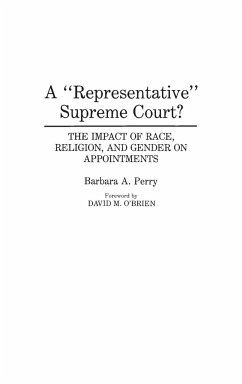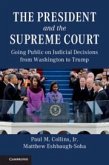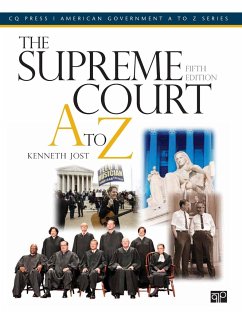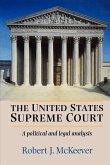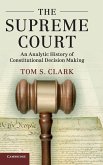Perry offers a detailed look at the impact of religion, race, and gender on appointments to the U.S. Supreme Court, and places the factors that have influenced presidential decisions into their historical and political contexts. Analyses of the appointments of eight Catholics, five Jews, one black, and one woman reveal a history of decision-making based on the recognition of specific groups. Perry draws on numerous sources, including interviews with seven Court members, in addressing the question of whether "representative" factors should play a role in nominating justices.
In recent decades, the U.S. Supreme Court has taken on an increased political prominence, due largely to such controversial issues as abortion, the separation of church and state, and civil rights. Because such issues could be affected by a Court member's personal beliefs and experiences, the question of how race, religion, and gender influence Supreme Court appointments is a crucial one. In this work, Barbara Perry explores the impact of these factors on the Court, placing the presidential nominations in their historical and political contexts. She examines the question of whether justices should be chosen in order to create a representative court that reflects elements in American society. The book is based on both primary and secondary sources, including interviews with seven members of the Court. Following a detailed introduction, Perry provides a historical analysis of the appointments of eight Catholics, five Jews, one black, and one woman, revealing a link between the appointments and the political, social, electoral, and demographic contexts in which they were made. She traces the decline in importance of the religious factor, as the ascendence of religious groups in mainstream politics no longer made it necessary for presidents to maintain a representative Court position. Representative considerations, however, will continue to play a role in the selection process, and Perry argues for a reconciliation between the undeniable pull of politics and ideology and the demands for merit-based appointments. This work will add an important new perspective to studies of the Supreme Court, as well as to the study of law, political science, and American history.
Hinweis: Dieser Artikel kann nur an eine deutsche Lieferadresse ausgeliefert werden.
In recent decades, the U.S. Supreme Court has taken on an increased political prominence, due largely to such controversial issues as abortion, the separation of church and state, and civil rights. Because such issues could be affected by a Court member's personal beliefs and experiences, the question of how race, religion, and gender influence Supreme Court appointments is a crucial one. In this work, Barbara Perry explores the impact of these factors on the Court, placing the presidential nominations in their historical and political contexts. She examines the question of whether justices should be chosen in order to create a representative court that reflects elements in American society. The book is based on both primary and secondary sources, including interviews with seven members of the Court. Following a detailed introduction, Perry provides a historical analysis of the appointments of eight Catholics, five Jews, one black, and one woman, revealing a link between the appointments and the political, social, electoral, and demographic contexts in which they were made. She traces the decline in importance of the religious factor, as the ascendence of religious groups in mainstream politics no longer made it necessary for presidents to maintain a representative Court position. Representative considerations, however, will continue to play a role in the selection process, and Perry argues for a reconciliation between the undeniable pull of politics and ideology and the demands for merit-based appointments. This work will add an important new perspective to studies of the Supreme Court, as well as to the study of law, political science, and American history.
Hinweis: Dieser Artikel kann nur an eine deutsche Lieferadresse ausgeliefert werden.

